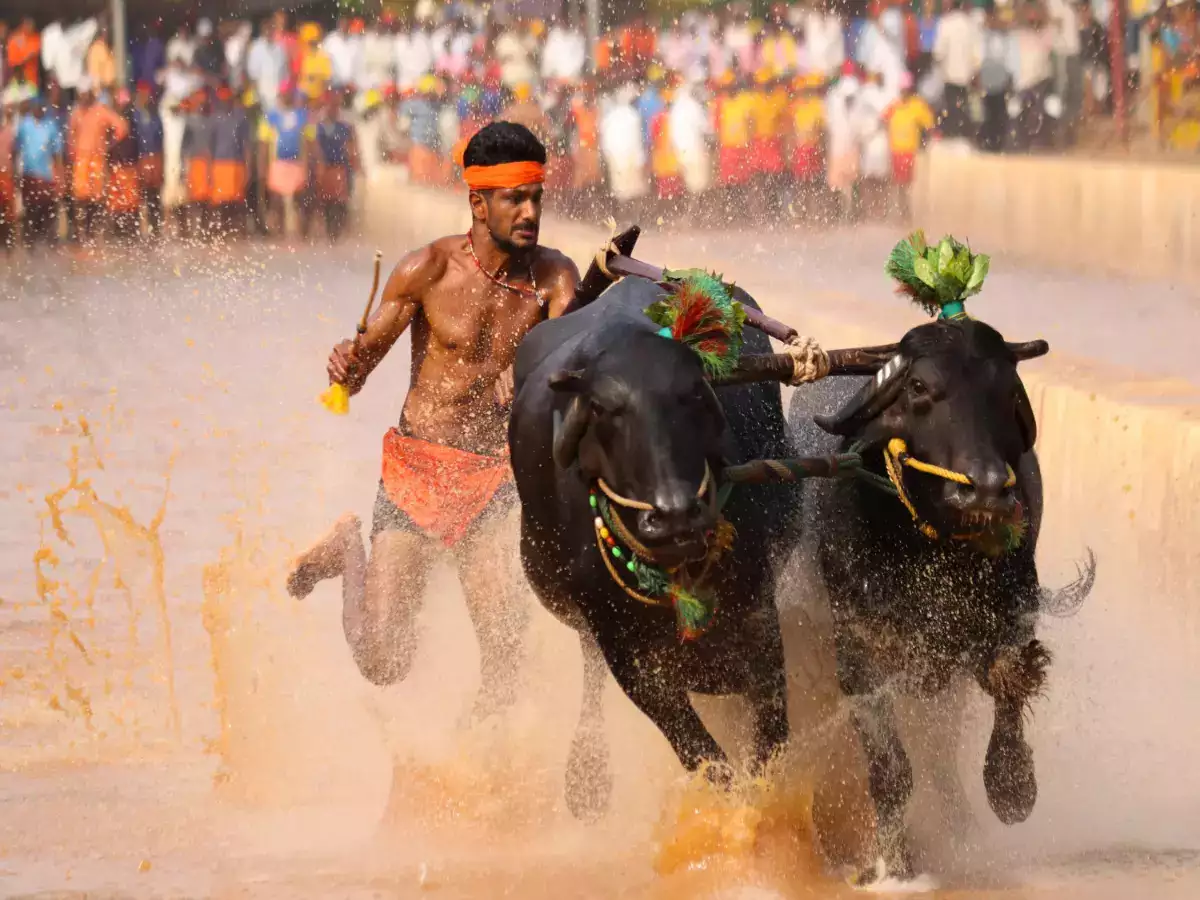Description

Disclaimer: Copyright infringement not intended.
Context
During the weekend of November 25 and 26, 160 pairs of buffaloes and their jockeys are set to race in the specially made slush tracks for Kambala races, being held at City Palace Grounds in Bengaluru.
Details
- Kambala is a traditional buffalo race that takes place in the coastal regions of Karnataka.
- The event is a unique and vibrant part of the local culture, deeply rooted in the agricultural traditions of the region.
Origin and History
- Ancient Tradition: Kambala has its roots in ancient farming practices where buffalo races were organized to thank the gods for a good harvest and to entertain the farming community.
- Cultural Significance: The event is not just a sport but also a cultural celebration that fosters a sense of community spirit and unity.
Event Structure
- Buffalo Pairs: Kambala involves pairs of buffaloes tethered to a plow-like device controlled by a handler, usually a farmer.
- Racing Tracks: The race takes place in muddy, water-filled tracks, often paddy fields, and the buffaloes are driven by the handlers who run alongside them.
Types of Kambala
- Pookere Kambala: In this type, the buffaloes are tied to a single plow, and the race is a straight dash.
- Baare Kambala: Here, the buffaloes are tied to a wooden plank, and the race involves two pairs of buffaloes competing side by side.

Categories of Kambala
Kambala is typically conducted in four categories:
- Negilu (Plough): Entry-level buffalo pairs participate using lighter ploughs.
- Hagga (Rope): Jockeys race buffaloes with only a rope tied to both animals.
- Adda Halage: Participants stand on a horizontal plank dragged by buffaloes.
- Kane Halage: A wooden plank tied to buffaloes, with water gushing out through holes as it is dragged. The winner is determined by the height of the splashing water.
Notable Kambala Events
- Kadri Kambala: One of the oldest and most popular Kambala events held near Mangalore.
- Kambala at Moodbidri: This event is known for its grandeur and attracts participants and spectators from all over Karnataka.
Recent happenings
Banning of Kambala:
- In 2014, Kambala, along with Jallikattu and bullock-cart racing, faced a ban following petitions by organizations like People for the Ethical Treatment of Animals (PETA).
- The allegations included animal abuse, particularly the tying of buffalo noses with a rope and continuous whipping during races.
Lifting the Ban:
- In January 2016, the Environment Ministry issued a notification allowing an exception for the continuation of traditional events like Kambala, recognizing their cultural significance.
- State governments amended the Prevention of Cruelty to Animals Act to provide exemptions, subject to conditions aimed at ensuring the welfare of the animals.
- A five-judge constitutional bench upheld these amendments in May of the same year, allowing Kambala and similar traditional sports to resume under specific regulations.
Controversies
Caste Discrimination Controversy:
- Historically, the Koraga community faced discrimination during Kambala, with members considered 'untouchable' and mistreated during the festival.
- Critics argue that, even today, the sport is controlled by dominant caste groups, while individuals from 'lower castes' are often relegated to menial roles during the event.
- Animal Rights Concerns: Kambala has faced criticism from animal rights activists who argue that the practice is harmful to the buffaloes.
- Regulatory Measures: In response to concerns, there have been efforts to regulate the sport, ensuring the humane treatment of animals during the races.
.jpg)
Conclusion
Kambala is more than just a race; it is a celebration of the cultural and agricultural heritage of the region. Despite facing challenges, it continues to thrive as a unique and cherished tradition, connecting generations and fostering a deep sense of community spirit. Efforts to balance tradition with modern concerns reflect the ongoing evolution of Kambala in the 21st century.
|
PRACTICE QUESTION
Q. What is the traditional buffalo race called, which takes place in the coastal regions of Karnataka, India, involving pairs of buffaloes tethered to a plow-like device and raced in muddy tracks?
a) Jallikattu
b) Kambala
c) Polo
d) Buzkashi
Answer:
b)
|
















